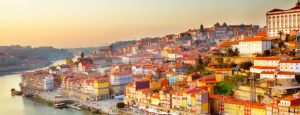Surely you have thought about how similar are Spanish and Portuguese. Well, let us tell you something: not everything is what it seems. There are indeed many similarities but there’s also a lot of differences that you’ll discover in the next paragraphs. Both the Spanish and the Portuguese evolved from the Latin. The Iberian countries had the same language that evolved differently but kept a lot of similarities. That is the main reason why most…
Before arriving in Lisbon, I knew very little about Portuguese people or Portugal itself. The only real connotations I had of Portugal were of the Algarve’s sandy beaches and Cristiano Ronaldo. I had tried a custard tart once whilst I was living in London, but in my mind, Portuguese cuisine was similar to Spain’s.
I knew nothing about the rich culture and the unpacked history, which had limited Portugal’s contact with the world for a long time up until the 1970s. To me, Portugal was a distant, sunny place which, before recently, was very seldom covered in travel magazines and websites, aside from the Algarve – a well-loved favourite of the British for holidays.
But Lisbon shattered my pre-conceptions and ignorance almost as soon as I landed.
As I stepped out of the taxi on my first visit to Lisbon, my feet hit cobbled stone, leading up to the small city flat I would be staying in during my stay in Lisbon. It was very different to the sandy beaches and large white villas I had seen in photos of the Algarve. Lisboan buildings can be both traditional and modern, a sprawling mass of mixed architectural styles piled on top of each other in a city-space that is thoroughly disorganised but impossibly beautiful.
One of the most striking parts of the city is the endless views, with the light framing the colourful streets against the blue sky at every twist and turn throughout Lisbon. The city is dotted with miradouros – or viewpoints in English – which offer the viewer the chance to gaze over vast swathes of the city, accompanied by a beer or a coffee if you so wish.
The cuisine is more diverse than I could have ever imagined, and contrary to my pre-conceptions, wildly different from that of Spain. Portuguese dishes have a distinctly arabic flair, influenced by the remnants of moorish rule in Lisbon’s past. Rice is a staple of most meals and there are nearly 400 different ways to cook the country’s famous salty fish dish, called ‘bacalhau’.
Despite several beaches nearby, Lisbon itself is home only to harbour. The city is urban, but has managed to retain its village-like feel, and locals continue to inhabit areas across all parts of the city.
Although Lisbon is multi-cultural, it still manages to embody an identity that is truly Portuguese. It is a quality of Lisbon that I have come to love – a local culture, mentality and community feeling that is rare in a city of its size.
To my untrained ear before living in Portugal, the Portuguese language was mysterious and almost Russian-sounding. But after some time in Lisbon, Portuguese began to sound less slavic, as my ear became more familiar with the unusual sounds.
I was surprised to find that my Spanish could normally pull me through most simple interactions, since Portuguese people tend to have a strong understanding of Spanish. But, if you already know Spanish, there’s still no room to get lazy with your Portuguese-learning – the language intelligibility does not generally work the other way around!








